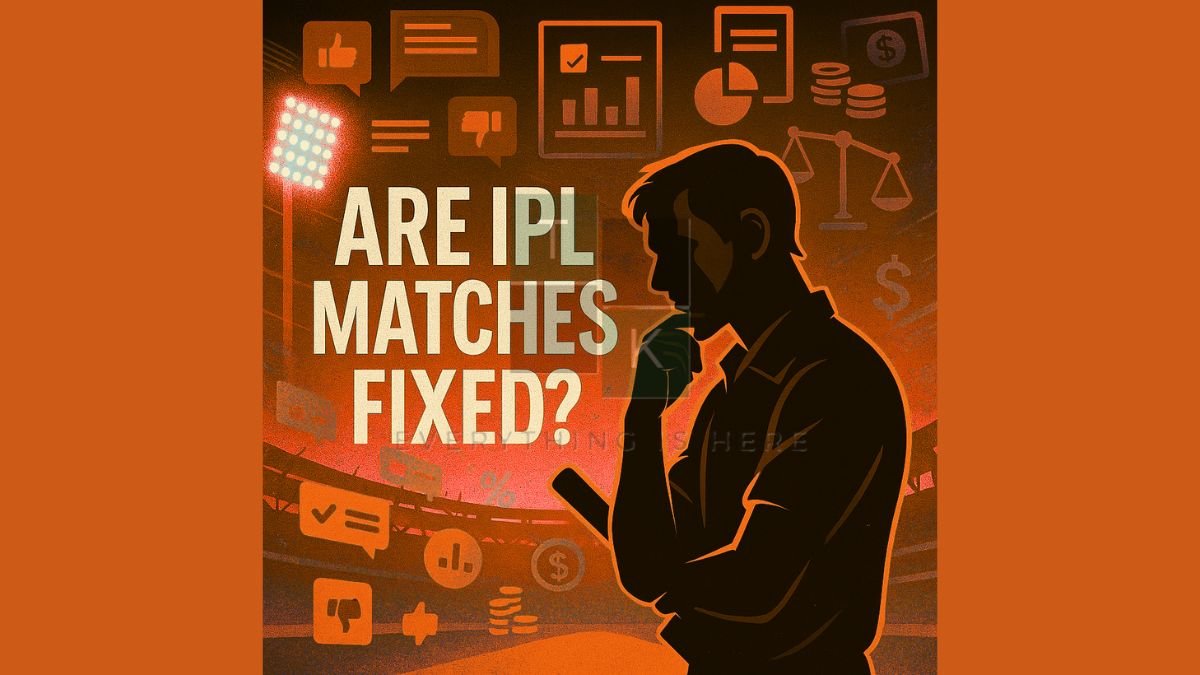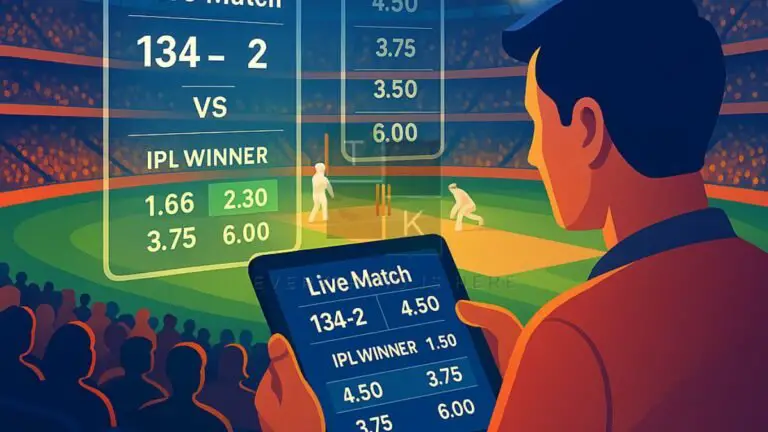The Indian Premier League (IPL) is more than just a cricket tournament—it’s a spectacle that merges sports with entertainment, drawing billions of fans worldwide. With every season comes heightened drama, nail-biting finishes, and, unfortunately, questions about the integrity of the game. One of the most persistent questions that arise in cricketing circles is: Are IPL matches fixed? In this blog, we explore the history, the scandals, the difference between match-fixing and spot-fixing, and what is being done to safeguard the game.
The High Stakes and High Suspicion
Cricket, particularly in India, carries an emotional intensity that few sports can match. The IPL, known for its glamorous players, massive viewership, and intense rivalries, is a playground for both sporting excellence and controversies. With billions of dollars circulating in advertising, sponsorships, and betting, it’s no wonder that allegations of match-fixing often come to the fore.
The idea of a fixed match unsettles fans, as it implies that not all outcomes are determined by sheer skill or a fair contest. This blog, “Are IPL Matches Fixed?” takes a comprehensive look at the matter, exploring past scandals, the structures in place for transparency, and examining whether these controversies cast a long shadow on the present-day IPL.
A Glimpse into the Past: The 2013 Spot-Fixing Scandal
The Scandal Unfolds
The year 2013 remains etched in IPL history due to its infamous spot-fixing scandal. High-profile players were implicated in rigging specific events within matches—such as bowling no-balls at prearranged moments—in exchange for monetary gain. Although the match outcomes were not directly manipulated, these actions shook public confidence and raised serious questions about the fairness of the game.
Impact on Teams and Bans
For instance, teams like Chennai Super Kings and Rajasthan Royals faced heavy consequences. The Board of Control for Cricket in India (BCCI) took strict measures, resulting in bans that impacted the franchises and players involved. These punitive actions demonstrated a firm stance from the governing bodies against corruption. However, the scandal left many fans wondering (Are IPL Matches Fixed?) if the integrity issues could resurface at any time.
Match-Fixing vs. Spot-Fixing: Understanding the Difference
What is Match-Fixing?
Match-fixing refers to the manipulation of the outcome of an entire match. In such cases, the end result is pre-determined through unethical or illicit means. This type of cheating undermines the very essence of competitive sports since the final score no longer reflects the true contest between teams.
What is Spot-Fixing?
Spot-fixing, on the other hand, involves the rigging of specific parts or events of the game—such as a predetermined no-ball, a particular over, or a specific ball outcome. While the overall match result might still be contested fiercely on the field, these fixed moments are arranged behind the scenes, often without detection by the average spectator.
The Key Difference
Understanding this difference is crucial because while match-fixing would call into question the entire competition, spot-fixing might leave the broader contest intact but still undermine certain aspects of the game. Today, spot-fixing remains a bigger concern because it can be more discreet and is typically arranged between discreet parties such as players and bookies.
Why do Fans Suspect Fixing in IPL?
Suspicious On-Field Incidents
Over the years, fans have occasionally raised eyebrows at decisions or moments that appear to come out of the blue. These include:
- Unexpected Performances: Sudden shifts in momentum or bizarre field placements that seem inconsistent with the match situation.
- Questionable Dismissals: Unusual dismissals or decisions where fielding teams seem to change tactics abruptly.
- Inconsistent Officiating: Moments where umpiring decisions appear inconsistent, giving rise to theories of influence or manipulation.
Although many of these instances have rational explanations—such as tactical innovations or genuine errors—the timing and context sometimes lead to widespread speculation (Are IPL Matches Fixed?) among cricket enthusiasts.
Media and Social Media Amplification
In today’s era of 24/7 sports news and real-time commentary, social media plays a large role in spreading narratives. A single controversial decision or an unexpected performance statistic can become viral, fueling conspiracy theories. Fans, influenced by a mix of past scandals and incomplete information, often interpret such moments as signals of underlying corruption.
How Governing Bodies are Fighting Corruption
BCCI’s Stance on Integrity
The Board of Control for Cricket in India (BCCI) has been at the forefront of implementing measures to ensure the integrity of the IPL:
- Anti-Corruption Units (ACU): Both the BCCI and the International Cricket Council (ICC) maintain dedicated units to monitor and investigate suspicious activities.
- Strict Regulations: The tournament operates under strict guidelines that require players, team officials, and even support staff to adhere to stringent anti-corruption policies.
- Player Education: Regular workshops and training sessions are organized for players to educate them about the dangers and ramifications of corruption and spot-fixing.
Global Standards and Collaboration
The IPL also collaborates with international cricket boards and law enforcement agencies to stay updated on the latest trends in sports betting and corruption. This collaboration ensures that any suspicious behavior is detected and dealt with promptly, maintaining the integrity of the sport.
Technological Interventions
Modern cricket now benefits from technological advances that can monitor unusual betting patterns and on-field performance statistics. These tools help authorities pinpoint anomalies that may require further investigation before, during, or after matches.
Are Current IPL Matches Still Rigged (Fixed)?
The Official Narrative
After the 2013 scandal and subsequent investigations, IPL administrators have introduced several layers of oversight. Official reports and the current governance structure vehemently assert that matches are not fixed. Every match is subjected to strict scrutiny to maintain fair play, with severe penalties in place for any misconduct.
The Skepticism Persists
Despite these measures, skepticism lingers. Critics argue that while the governing bodies have undoubtedly improved transparency, no system is foolproof. There are always outliers and isolated incidents that can be exploited by those with insider access or corrupt intent. However, statistically speaking, if the overall pattern were significantly manipulated, it would be nearly impossible to hide over the extensive run of matches played every season.
Balancing Skepticism and Evidence
It’s important to note that while isolated instances of corruption have been documented, the broad consensus among experts, former players, and independent observers remains that the IPL as a tournament is run fairly. The focus has shifted from concerns over match outcomes to stricter monitoring of specific in-game events.
Read also: Book IPL 2025 Tickets Online: Ticket Prices and Booking Details
Real Examples That Raised Eyebrows
The 2013 Spot-Fixing Saga Revisited
The most cited example remains the 2013 incident, where players were involved in deliberate no-ball actions and other irregularities. These actions, though not affecting the final outcome directly, were enough to mar the reputations of those involved and left fans with lasting doubts.
Instances of Unexplained Tactics
Beyond the headline-grabbing scandals, there have been matches where tactical decisions seemed out of place. Critics point to instances where a team’s strategy appeared to suddenly shift without a clear rationale, provoking discussions on whether undisclosed external influences played a role.
The Role of Betting Syndicates
The close relationship between illegal betting markets and cricket matches cannot be ignored. Reports indicate that vast sums of money are wagered on these games, and the presence of betting syndicates creates an environment ripe for corruption. Yet, with continuous monitoring and stricter sanctions on betting-related activities, authorities are making it increasingly difficult for such influences to go unchecked.
The Role of Illegal Betting in the IPL
Betting: A Double-Edged Sword
Betting is an intrinsic part of cricket fandom, with millions placing bets on match outcomes every season. However, the illegal nature of much of this betting in India means that there isn’t much transparency. This opacity can lead to scenarios where betting syndicates try to manipulate game elements to secure a profit.
Regulatory Oversight
To counteract this, the BCCI and law enforcement agencies worked in tandem to track and intercept illegal betting operations. The crackdown on such activities has been rigorous in recent years, with arrests and prosecutions that serve as deterrents for potential corruption. Yet, the reality remains that as long as vast sums of money are on the line, the temptation—and the risk—of corruption will continue to lurk in the background.
Public Perception vs. Reality
For many fans, the mere association of widespread betting creates a perception that all is not well. However, it’s essential to balance this perception with the fact that many matches proceed without any instances of fraud or manipulation, reaffirming the credibility of the IPL’s oversight mechanisms.
Expert Opinions: What Do the Insiders Say?
Former Players and Commentators
A number of former players and cricket commentators have weighed in on the controversy. Many assert that while corruption did exist in isolated incidents, the modern IPL—with its advanced monitoring tools and improved regulatory environment—stands apart from its troubled past. Their consensus is that the spirit of competitive cricket dominates the tournament.
Journalists and Independent Analysts
Sports journalists have documented both the improvements in governance and occasional lapses that raise questions. Independent analysts argue that while isolated episodes may occur, they are exceptions rather than the norm. The overall data indicates that meaningful match manipulation has become rarer over time, thanks to continual improvements in oversight.
Academic and Legal Perspectives
Researchers studying sports integrity have noted that the measures implemented post-2013 serve as a strong deterrent. Legally, those found guilty of participating in fix schemes face severe penalties, which have had a cooling effect on would-be corrupt practices. This academic and legal backing further reinforces the view that the IPL, as administered today, is not fixed.
The Final Verdict: Is the IPL Truly Clean?
After evaluating the evidence, historical scandals, and the layers of oversight now in place, the verdict is nuanced:
- No, IPL matches as a whole are not fixed. The governing bodies have instituted rigorous systems, and there is no credible evidence suggesting systematic manipulation of match results.
- Yes, isolated instances of spot-fixing and corruption have occurred. These exceptions, while serious, are outliers rather than reflective of the overall fairness of the tournament.
It is clear that while the IPL has its blemishes, the combined efforts of regulatory bodies, technological oversight, and legal deterrents have significantly reduced the scope of corruption in the current landscape.
Frequently Asked Questions (FAQs) about Are IPL Matches Fixed?
A: Match-fixing involves pre-determining the entire outcome of a game, while spot-fixing targets specific moments or actions within a match without necessarily affecting the final result.
A: There has been no confirmed evidence that current IPL matches are systematically fixed. Modern oversight and anti-corruption measures have strengthened integrity in the tournament.
A: The BCCI has established anti-corruption units, strict guidelines, regular player education programs, and technological monitoring systems. These measures are designed to detect and prevent any irregularities.
A: Fans’ suspicions often arise from past scandals, isolated incidents during games, and the pervasive influence of illegal betting. Social media and media reports can also amplify these doubts.
A: Report your concerns to the appropriate authorities, such as the BCCI’s anti-corruption unit, or through platforms provided by cricketing bodies that monitor such activities.
Conclusion: Are IPL Matches Fixed?
The question “Are IPL matches fixed?” is as complex as it is emotive. While the IPL has seen its share of controversies—most notably the 2013 spot-fixing scandal—the current framework in place ensures that the tournament is run fairly. Advances in technology, stricter regulations, and a commitment to integrity by cricket’s governing bodies have all contributed to a safer playing field.
For fans, maintaining skepticism is natural, but it’s also important to recognize the efforts made to preserve the sport’s integrity. Ultimately, the IPL remains one of the world’s premier sporting events, celebrated for its high level of competition and the unpredictable thrill that is the essence of cricket.
Whether you’re a die-hard fan or a casual observer, stay informed, enjoy the game, and appreciate the continuous journey toward a fair and untainted sporting atmosphere.
Sources:
- https://www.bcci.tv/about/bcci-constitution?utm_source=chatgpt.com
- https://en.wikipedia.org/wiki/2013_Indian_Premier_League_spot-fixing_and_betting_case
- https://documents.bcci.tv/bcci/documents/1638284153_AntiCurruption-BCCI.pdf
- https://www.icc-cricket.com/about/integrity/anti-corruption/about-us
🚨 Stay Updated with TopKhoj! 🚨
Get the latest tech news, deals, and exclusive offers first!
📰 Visit News Section📲 Join our Telegram Channel for real-time updates and best deals!
🔗 Join Telegram Now💡 Stay informed and never miss a great deal with TopKhoj!
⚠️ Disclaimer: Any link provided in the article related to a product or service will redirect you to our affiliate partner(s)' website, which are affiliate links. This means that if you make a purchase through these links, we may earn a commission at no extra cost to you. This commission helps support our blog and our work.
🔔 All prices mentioned above are subject to change based on current offers and availability on e-commerce platforms. Please check the latest price and product details on the product page before making a purchase.







